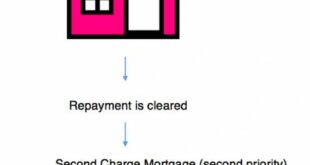Contents
Understanding Second Charge Mortgages
Second-charge mortgages, often called “second mortgages” or “homeowner loans,” are a unique financial product that offers homeowners a means to access additional funds secured against their property. This type of loan can be a practical solution for those who require substantial money for various purposes, such as home improvements, debt consolidation, or even a second property purchase.
How Second Charge Mortgages Differ from First Mortgages
One common question is how second-charge mortgages differ from traditional first mortgages. The critical distinction is that a first mortgage is a primary loan used to purchase a property. In contrast, a second-charge mortgage is a secondary loan against the existing property’s equity. In essence, second-charge mortgages involve borrowing against the value of your home while still making payments on your primary mortgage.
Eligibility and Qualifications Mortgages
Securing a second charge mortgage involves meeting specific eligibility criteria. Lenders generally require applicants to be homeowners with some equity in their property. Additionally, your credit score, income, and the amount of equity available in your home will significantly determine eligibility and the loan terms.

Advantages of Second Charge Mortgages
Second-charge mortgages offer several advantages, making them an attractive option for many homeowners. Some key benefits include:
- Lower Interest Rates: Second-charge mortgages typically have lower interest rates than unsecured loans or credit cards, as they are secured against your property.
- More significant Loan Amounts: Due to the security of the property, you can often borrow more substantial sums of money with a second-charge mortgage.
- Flexibility: These loans are versatile and can be used for various purposes, from home improvements to debt consolidation.
- More extended Repayment Periods: Second-charge mortgages often come with more extended repayment periods, making monthly payments more manageable.
Risks and Considerations
While second-charge mortgages offer numerous advantages, it’s essential to understand the potential risks and considerations involved. Some key points to keep in mind include:
- Risk to Your Home: Defaulting on a second charge mortgage can result in the loss of your property, as it’s used as collateral.
- Interest Costs: Over time, the interest costs can accumulate, making the total repayment amount higher than the original loan.
- Regulatory Changes: Monitor any regulation changes affecting the second-charge mortgage market.
- Alternative Options: It’s wise to explore alternative financing options and consult a financial advisor before committing to a second-charge mortgage.
In conclusion, second-charge mortgages can be a viable financial solution for homeowners looking to access funds while leveraging their property’s equity. By understanding the eligibility criteria, benefits, and potential risks associated with these loans, you can make an informed decision that suits your financial needs and circumstances. Always consult a qualified financial advisor before proceeding with a second-charge mortgage to ensure it’s the right choice.

Unlocking the Power of Second Charge Mortgages
Subtitle 1: Understanding Second Charge Mortgages
In this section, you can introduce readers to second-charge mortgages. Explain what they are, how they differ from first-charge mortgages, and the situations where they might be a viable option for homeowners.
Benefits of Second Charge Mortgages
Discuss the advantages of opting for a second-charge mortgage. Highlight how they can help homeowners access funds without disturbing their existing mortgage deals, and mention the flexibility they offer regarding repayment options.
When to Consider a Second Charge Mortgage
Detail the scenarios in which homeowners might consider a second charge mortgage. This could include home improvement projects, debt consolidation, or covering unexpected expenses. Offer guidance on whether this is the right choice for their financial situation.
The Application Process
Walk readers through the process of applying for a second-charge mortgage. Explain the documentation required and the criteria lenders look for, and provide tips on improving one’s chances of approval.
Potential Risks and Alternatives
Discuss the potential risks associated with second-charge mortgages, such as higher interest rates and losing one’s home in case of default. Also, offer alternatives for homeowners, such as personal loans or mortgaging.
Conclusion: Making Informed Financial Decisions
Sum up the article’s key points and emphasize the importance of making informed financial decisions. Encourage readers to seek professional advice and thoroughly research their options before committing to a second-charge mortgage.
Please note that conducting thorough research and providing accurate and up-to-date information in your article is essential. Additionally, consider consulting with a financial expert to ensure the content is informative and reliable.

What Are Second Charge Mortgages?
Second-charge mortgages, also known as “secured loans” or “homeowner loans,” are a financial product that allows homeowners to borrow against the equity in their property. Unlike traditional mortgages, which are used to buy a home, second-charge mortgages allow homeowners to access a lump sum of money using their property as collateral.
These loans are called “second charges” because they are subordinate to the first mortgage on the property. In other words, if you default on your second charge mortgage, the lender has the right to repossess your property after the primary mortgage lender’s claims are satisfied.
When Should You Consider a Second Charge Mortgage?
Second-charge mortgages can be a valuable financial tool in certain situations. Here are some scenarios where you might consider taking out a second charge mortgage:
- Home Improvements: Many homeowners use second-charge mortgages to fund home renovation projects. This can be a cost-effective way to increase the value of your property.
- Debt Consolidation: If you have multiple high-interest debts, a second-charge mortgage can help you consolidate them into a single, more manageable loan with a lower interest rate.
- Business Investment: Entrepreneurs often use second-charge mortgages to fund their business ventures, as the interest rates are typically lower than unsecured business loans.
- Education Expenses: You can use a second-charge mortgage to pay for your or your child’s education, taking advantage of the lower interest rates than other borrowing forms.
- Emergency Expenses: In case of unexpected medical bills or other urgent financial needs, a second-charge mortgage can provide a lifeline.
How Do Second Charge Mortgages Work?
When you apply for a second-charge mortgage, the lender assesses the value of your property and the amount of equity you have in it. The loan amount you can access depends on your home’s value and the percentage of equity you own.
Second-charge mortgages are typically structured as fixed or variable-interest-rate loans, and the terms vary widely between lenders. The loan term can extend from several years to several decades, depending on your preferences and the lender’s policies.
Repayment options are flexible. You can make interest-only payments or opt for a repayment mortgage, including both interest and principal fees. Second-charge mortgages’ interest rates are generally lower than those for unsecured loans, making them an attractive choice for many borrowers.
The Pros and Cons of Second Charge Mortgages
Like any financial product, second-charge mortgages have advantages and disadvantages.
Pros:
- Lower Interest Rates: Second-charge mortgages typically offer lower interest rates than unsecured loans or credit cards, making them a cost-effective option for borrowing.
- Large Loan Amounts: You can often access a more significant loan with a second-charge mortgage compared to unsecured loans.
- Flexible Repayment Options: You can choose between interest-only or repayment mortgages, depending on your financial situation.
- Access to Equity: You can unlock the equity in your home without having to remortgage or disturb your existing mortgage.
 Ahammed World Afffaires
Ahammed World Afffaires


